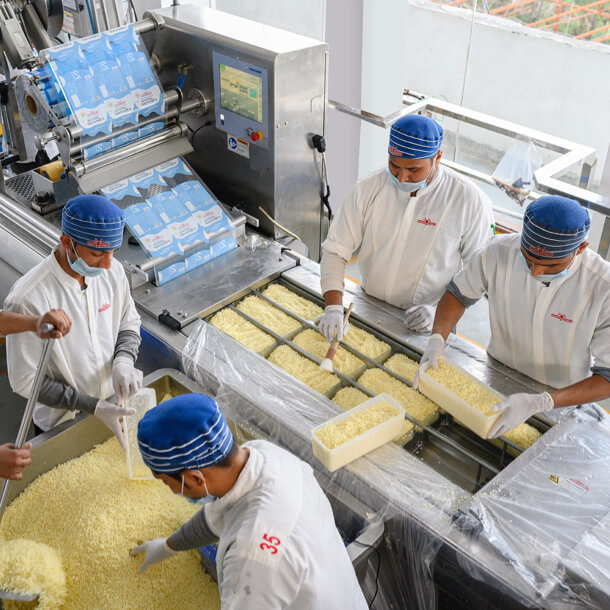Order Cheese for Sale Online Melbourne's Trusted Cheese Makers
Order Cheese for Sale Online Melbourne's Trusted Cheese Makers
Blog Article
A Thorough Consider Cheese Manufacturing: Components, Techniques, and the Future of Artisan Cheeses
The elaborate procedure of cheese production is a remarkable convergence of art and scientific research, where high-quality milk, rennet, and certain microbial cultures offer as fundamental aspects. As the industry increasingly prioritizes sustainability and transparency, the future of artisan cheeses guarantees to show both heritage and development.
Key Ingredients in Cheese Manufacturing
A variety of necessary ingredients play a crucial role in cheese manufacturing, each adding to the final item's taste, texture, and personality. The main active ingredient in cheese is milk, which can originate from various resources, including cows, goats, and lamb - cheese makers melbourne. The sort of milk utilized dramatically influences the cheese's taste and uniformity; for example, cow's milk normally produces creamier cheeses, while goat's milk typically generates tasty varieties
One more essential active ingredient is rennet, an enzyme made use of to curdle the milk, separating it into curds and whey. The resource of rennet can be animal, vegetable, or microbial, each imparting distinctive characteristics to the cheese.
Salt not only boosts the flavor but also acts as a preservative, preventing the development of undesirable germs. In addition, different flavoring agents, such as herbs, flavors, and even smoked wood, can be included in produce distinct artisanal cheeses. Together, these active ingredients develop the foundation of cheese production, setting the phase for diverse and abundant cheese varieties.
Conventional Cheese-Making Techniques
Using typical cheese-making strategies, artisans around the globe preserve time-honored methods that have been given through generations. These strategies frequently highlight making use of high-quality, locally sourced milk, which is central to the special tastes and textures of artisanal cheeses. The process generally begins with the careful home heating of milk, followed by the addition of societies and rennet to promote coagulation.
When the curds create, they are cut, enabling whey to drain pipes, an essential action that influences moisture material and structure. Salting is an essential facet of this process, enhancing taste while likewise acting as a preservative.
Aging, or affinage, is one more important element, during which cheeses develop their characteristic aromas and tastes. Craftsmens might utilize details aging settings, making use of humidity and temperature controls to improve celebrity's profile. The commitment to these standard approaches not only sustains local economies yet likewise adds to the abundant variety of cheese ranges found around the world, celebrating cultural heritage and artisanal craftsmanship.
Modern Developments in Cheese Production
Exactly how have technological innovations changed cheese production in current years? The assimilation of modern innovation has transformed both the performance and high Our site quality of cheese manufacturing.
Furthermore, advancements in microbiology have allowed cheesemakers to select certain bacterial societies and enzymes, enhancing flavor profiles and boosting service life. Using sensor technology for monitoring fermentation conditions has actually additionally become prevalent, enabling real-time changes to preserve optimal settings for cheese aging.

These innovations not only boost the high quality and sustainability of cheese production but additionally encourage craftsmen manufacturers to keep standard tastes while embracing modern effectiveness. As innovation remains to progress, the future of cheese manufacturing looks appealing, blending practice with technology.
The Duty of Terroir in Cheese
In the realm of cheese manufacturing, terroir plays a crucial duty in specifying the unique features of numerous cheeses. Terroir, a French term commonly connected with red wine, includes the environmental aspects that influence agricultural products, including soil make-up, climate, and regional plants and animals. In cheese-making, the one-of-a-kind qualities of the area where the milk is sourced can impart certain tastes and appearances to the end product.
For instance, the grazing problems of dairy animals dramatically impact the milk's composition, affected by the types of turfs and herbs readily available in a specific area. This varies not only in between nations but likewise between areas within the exact same nation. Additionally, the microbial areas existing in the environment add to the fermentation processes, resulting in varied accounts in flavor and aroma.
Cheeses such as Roquefort, Parmigiano-Reggiano, and Cheddar exhibit exactly how terroir can form their identifications, making them distinctive find more info and typically protected by geographical indications. As manufacturers increasingly identify the significance of terroir, there is an expanding focus on sourcing neighborhood ingredients and keeping standard techniques, making sure that each cheese truly reflects its beginning.

Future Patterns in Craftsmen Cheeses
A remarkable shift is occurring in the artisan cheese industry, driven by advancing consumer choices and technical innovations. Significantly, consumers are moving towards special, top quality items that emphasize both sustainability and neighborhood sourcing - cheese makers melbourne. This pattern is triggering artisan cheesemakers to innovate, concentrating on small-batch manufacturing and using typical strategies while incorporating modern-day innovation to enhance top quality and safety
In addition, there is a growing passion in plant-based and different milk products, pressing traditional cheesemakers to discover new methods, such as cashew or almond-based cheeses. This change not only provides to dietary restrictions yet likewise lines up with ecological worries regarding pet farming.
Additionally, transparency in sourcing and manufacturing procedures is becoming extremely important. Customers are much more educated and demand traceability, prompting producers to embrace clearer labeling methods and engage in narration that highlights their methods and worths.
Final Thought
To conclude, the elaborate process of cheese production melds typical strategies with modern innovations, causing a varied variety of tastes and appearances. The emphasis on top quality components and the influence of terroir underscore the virtuosity entailed in cheese manufacturing. As the industry develops, a concentrate on sustainability and transparency will likely shape the future of artisan cheeses, satisfying a progressively discerning customer base that values authenticity and craftsmanship in milk products.
Report this page